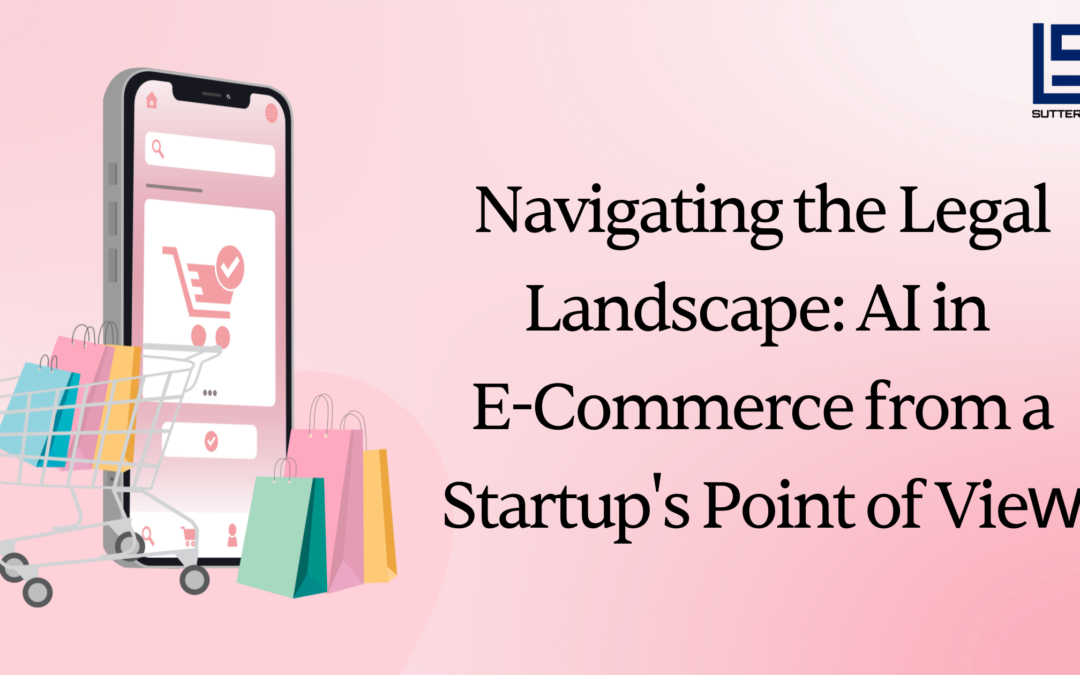Table of Contents
- Introduction to AI in E-Commerce
- Understanding the Legal Considerations of AI in E-Commerce
- Legal Challenges Faced by Startups Integrating AI in E-Commerce
- Strategies for Navigating the Legal Landscape
- Case Studies of Successful Startups Embracing AI in E-Commerce
- Hiring Legal Expertise for AI in E-Commerce Startups
- Conclusion: Embracing AI in E-Commerce While Complying with the Law
Introduction to AI in E-Commerce
As startup attorneys working with entrepreneur in the thriving world of e-commerce, I have witnessed firsthand the transformative power of artificial intelligence (AI) in revolutionizing the way businesses operate.
AI has brought about significant advancements in various aspects of e-commerce, from personalized recommendations to chatbots for customer service.
Understanding the legal considerations surrounding AI in e-commerce is crucial for our startups clients.
I hope that this blog post will give you a glimpse into the legal landscape of AI in e-commerce, we will explore compliance with data protection laws, intellectual property rights, ethical implications, legal challenges faced by startups, strategies for navigating the legal landscape, and the importance of hiring legal expertise, like us an Sutter Law.
Let’s embark on this journey together!
Understanding the Legal Considerations of AI in E-Commerce
Compliance with Data Protection Laws
One of the primary concerns in the age of AI is data protection.
As AI algorithms rely heavily on collecting and analyzing vast amounts of user data, startups must ensure compliance with data protection laws.
For example, the General Data Protection Regulation (GDPR) in the European Union requires businesses to obtain explicit user consent for data collection and processing. We have all seen the annoying popup asking for our permission, now you know why you are seeing them.
It is essential for startups to implement robust data protection measures, such as encryption and anonymization, to safeguard user information and comply with these regulations.
Failure to do so can lead to severe legal consequences, including hefty fines and damage to the company’s reputation.
Intellectual Property Rights and AI Technology
AI technology heavily relies on intellectual property (IP) rights, as it involves the creation and development of innovative algorithms and models.
Startups must navigate the complex landscape of IP rights to protect their AI innovations. This includes obtaining patents for novel AI algorithms and copyrights for AI software.
Additionally, startups must be cautious not to infringe upon the IP rights of others when utilizing pre-existing AI technologies. Conducting thorough due diligence and seeking legal advice can help startups navigate this legal minefield and protect their intellectual property. There have been some resent rulings regarding the fair use of other parties IP when fed into AI models. see Andersen et al. v. Stability AI Ltd.
Ethical Implications of AI in E-Commerce
While AI brings immense benefits to the e-commerce industry, it also raises ethical concerns. Startups need to ensure that their AI systems do not discriminate against certain groups or perpetuate biases.
For instance, AI algorithms used for recruitment or pricing decisions should be fair and unbiased.
Moreover, transparent and explainable AI systems are essential to maintain trust and accountability.
Startups should proactively address these ethical implications by incorporating ethical guidelines into their AI development processes and regularly assessing the impact of their AI systems on different stakeholders.
Legal Challenges Faced by Startups Integrating AI in E-Commerce
Integrating AI into e-commerce operations poses unique legal challenges for startups.
Firstly, startups must navigate through various regulatory frameworks, which can be complex and vary across different jurisdictions.
Compliance with these regulations can be daunting, particularly for small businesses with limited resources.
Secondly, startups may face legal barriers when accessing and using third-party data for training their AI algorithms. see Andersen et al. v. Stability AI Ltd.
This includes ensuring that the data used is lawful and does not infringe upon the rights of others. Lastly, startups must be prepared to address legal liabilities arising from AI-related errors or malfunctions.
It is vital to have contingency plans and adequate insurance coverage to mitigate such risks.
Strategies for Navigating the Legal Landscape
Navigating the legal landscape of AI in e-commerce requires a proactive and strategic approach.
Startups can implement the following strategies to ensure compliance with the law:
Conduct a Legal Assessment
Before integrating AI into e-commerce operations, startups should work with their AI startup attorneys to conduct a comprehensive legal assessment.
This involves identifying and understanding the legal risks associated with AI, including data privacy, intellectual property, and liability issues.
Seeking legal expertise during this assessment can provide valuable insights and guidance.
Implement Privacy-by-Design Principles
Privacy-by-design principles involve incorporating privacy and data protection measures into the design and development of AI systems.
Startups should prioritize data minimization, encryption, and anonymization techniques to protect user information from unauthorized access or misuse.
By embedding privacy measures into the core of their AI operations, startups can demonstrate a commitment to data protection and compliance.
Stay Updated with Regulatory Changes
The legal landscape surrounding AI in e-commerce is constantly evolving. Startups must stay updated with the latest regulatory changes and industry guidelines to ensure ongoing compliance. A good AI startup attorney will keep you in the loop as changes occur.
This can be achieved by regularly monitoring legal developments, attending industry conferences, and engaging with legal experts who focus in AI and e-commerce legal landscape.
Case Studies of Successful Startups Embracing AI in E-Commerce
To gain a better understanding of how startups have successfully navigated the legal landscape of AI in e-commerce, let’s explore a few inspiring case studies:
Case Study 1: Company X
Company X is a startup that leverages AI to provide personalized product recommendations to its e-commerce customers.
To comply with data protection laws, they obtained explicit user consent for data collection and implemented robust encryption measures.
Additionally, Company X conducted regular audits to ensure the fairness and transparency of their AI algorithms. By prioritizing legal compliance and ethical considerations, Company X built customer trust and achieved remarkable success.
Case Study 2: Company Y
Company Y is a small e-commerce startup that integrated AI-powered chatbots for customer service.
Recognizing the legal challenges associated with AI, they hired legal experts specializing in data protection and intellectual property.
This allowed them to navigate complex legal frameworks, protect their intellectual property, and establish strong data protection practices.
Company Y’s investment in legal expertise proved instrumental in their growth and sustainability.
Read also: Remote Work Legalities: Ensuring Compliance with California Employment Laws
Hiring Legal Expertise for AI in E-Commerce Startups
Navigating the legal landscape of AI in e-commerce can be overwhelming for startups.
Hiring legal expertise who focus in AI and e-commerce is crucial to ensure compliance and mitigate legal risks.
Legal professionals can provide guidance on data protection, intellectual property, contract negotiations, and regulatory compliance.
While it may require financial investment, the long-term benefits of having legal experts on board far outweigh the potential legal pitfalls that startups may encounter. Contact Sutter Law
Conclusion: Embracing AI in E-Commerce While Complying with the Law
As a startup in the rapidly evolving world of e-commerce, embracing AI technology can unlock numerous opportunities for growth and innovation.
However, startups must navigate the legal landscape surrounding AI in e-commerce to ensure compliance with data protection laws, protect intellectual property, address ethical implications, overcome legal challenges, and implement effective strategies.
By conducting legal assessments, prioritizing data privacy, staying updated with regulations, and hiring legal expertise, startups can confidently embrace AI while complying with the law.
Let us embark on this exciting journey with AI, guided by legal knowledge and ethical considerations, to build a sustainable and successful future in e-commerce.






